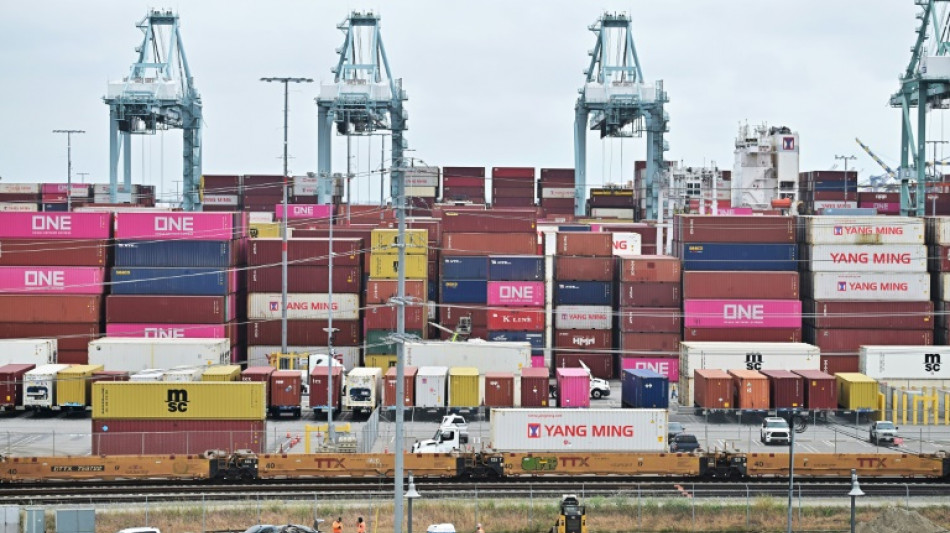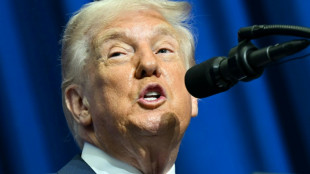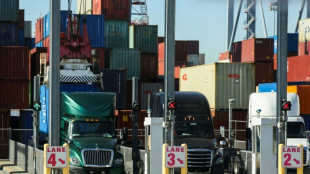

G7 finance leaders gather with Ukraine, tariff concerns at fore
Top finance leaders from the G7 nations gather in Canada starting Tuesday, with concerns including war in Ukraine at the fore while the advanced economies grapple with fallout from US President Donald Trump's sweeping tariffs.
In talks running through Thursday, leaders are set to discuss global economic conditions, with participants seeking a common position on Ukraine, while issues like non-market practices are also on the agenda.
Ukrainian Finance Minister Sergii Marchenko also will be present at the meeting of Group of Seven finance ministers and central bank governors in Canada's western province of Alberta.
The talks come amid an uncertain approach among the G7 democracies towards the war in Ukraine -- after Russia's invasion in 2022 -- since Trump returned to the presidency this year.
Once broadly unified, the G7 -- Britain, Canada, France, Germany, Italy, Japan and the United States -- has been rattled by Trump, who has reached out to Russia and slapped tariffs on both allies and competitors.
Trump said Russia and Ukraine would start peace talks after he spoke with Russian President Vladimir Putin on Monday.
A source briefed on US participation in the G7 meeting in Banff, Alberta said Washington is not inclined to "do a communique just for the sake of doing a communique." They said a consensus will have to align with Trump administration priorities.
Canada's Prime Minister Mark Carney earlier invited Ukrainian President Volodymyr Zelensky to the G7 summit in June, and Ukraine's Marchenko is due to field media questions on Tuesday.
A US Treasury spokesperson said Treasury Secretary Scott Bessent would look to get the grouping "back to basics and focused on addressing imbalances and non-market practices in both G7 and non-G7 countries."
The source briefed on US participation noted it was unacceptable from the G7's perspective that countries would allow China's excess industrial capacity to flood their domestic sectors, adding that this would be on the agenda.
While the grouping discusses policies and solutions to issues like trade, security and climate change, analysts warn of unpredictability as leaders deal with internal tensions.
- 'Elephant in the room' -
"This is an unusual G7," said Ananya Kumar, a deputy director at Washington-based think tank, the Atlantic Council.
While talks often center on major policy priorities across members and guests, such as sanctions on Russia, the economic impact of Trump's tariffs has cast a pall, she told AFP.
In recent months, Trump has slapped a blanket 10 percent tariff on most US trading partners, threatening higher rates on economies including the European Union.
He also imposed tariffs on imports of steel, aluminum and autos, raising the temperature with G7 countries. The implementation of a recent pact with Britain remains clouded by uncertainty.
Last month, the International Monetary Fund slashed its global growth forecast over the tariffs' effects, with top US partners like Canada to be negatively hit.
"It's an elephant in the room," Kumar said. "I think a possible metric for success is that the US wants to engage and negotiate a trade deal with these countries."
While officials told AFP they are not expecting trade agreements to be unveiled this week, they maintain that parties have made progress in talks and the Banff gathering will be another chance to find common ground.
Leaders will be seeking out Bessent, who helped broker a de-escalation in staggering tit-for-tat levies with China.
"He has shown that he can be the adult in the room," said Carl Weinberg, chief economist at research group High Frequency Economics.
But Bessent remains "under pressure from the Trump administration to deliver the agenda," Weinberg told AFP.
Trying to move forward on trade will help with progress on other issues, said the Atlantic Council's Kumar.
She expects members to seek "commitment towards the status quo with Ukraine" too.
Canadian Finance Minister Francois-Philippe Champagne is set to co-chair sessions on the global economy, economic resilience and security, alongside conditions in Ukraine.
There will be sessions on financial crime and artificial intelligence too.
P.Caruso--MJ



